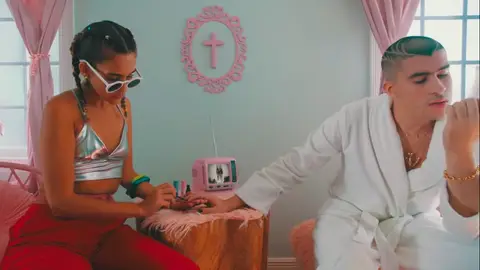How Bad Bunny Bridges LGBTQ And Latinx Identities With His Inclusive ‘Caro’ Video

By Lucas Villa
As rising star Bad Bunny is making money moves in the music industry, he's using his platform to pay it forward to underrepresented peoples. And with last month’s release of the music video for "Caro,” a cut from his late-2018 debut X 100pre, the Puerto Rican rapper came out as ally to the LGBTQ community. His inclusive spotlight in the flashy clip is a worthwhile watch for a Latinx community, and the world at large, that could use more of it.
Bad Bunny, whose real name is Benito Antonio Martínez Ocasio, has been working the Latin trap music market since 2016, earning high-profile features and hit singles before even dropping an album. He was taken under the wing of Latinx heavyweights like fellow Puerto Rican singer Ozuna, Colombian superstar J Balvin, and reggaeton music's resident veteran Daddy Yankee, and on the strength of these co-signs, as well as his playful flow and unapologetic attitude, he's amassed millions of fans.
Last year, Bad Bunny ranked at No. 8 on Spotify's most-streamed Latin artists list. Among the countless hits he's registered on Billboard's Latin Songs chart, the 24-year-old has also landed seven songs on the all-genre Hot 100 chart, including the No. 1 hit "I Like It" with Cardi B and J Balvin. And with Latin music consumption having outpaced country music in the U.S. this past year, Bad Bunny has staked himself as one of the loudest Latinx voices leading this sea change.
Bad Bunny finally dropped X 100pre (meaning "siempre" in Spanish, or “forever" in English) on December 24. It's been lodged in the top spot of Billboard's Hot Latin Albums chart for six weeks now, and peaked at No. 11 on the Billboard 200. The album is loaded with songs where he's either feeling himself or in his feelings, but the music videos for its songs have mostly steered away from the rapper to focus on his message. "Solo de Mí," for example, stars an abused woman who finds strength in his lyrics that translate to: "Don't call me, baby / I'm not yours or anyone's / I'm mine alone." In an Instagram post about the video, Bad Bunny wrote in Spanish, "I'm not sure if cockfights are abuse, but gender violence against women and the absurd amount of women who are murdered is."
Bad Bunny's latest music video for "Caro," which translates to "expensive" in English, is another that highlights women alongside other marginalized groups like the LGBTQ community. With his painted, manicured nails and flamboyant sense of style, he's been at odds with the machista, or often toxic masculinity, culture that's often ingrained in Latinx life. Those nails made headlines in July when a salon in Oviedo, Spain refused him service. Bad Bunny posted about the incident on Instagram and wrote, "They told me NO because I'm a MAN. What year is it? F**king 1960?" But his peers have been far more supportive. In a conversation with Complex last September, J Balvin declared that Bad Bunny's colorful presence in the urban music scene made him an example that would help "people depriving themselves of being who they really are."
Accordingly, the music video for "Caro" opens with Bad Bunny getting his nails painted black. But when the camera refocuses on the rapper, he's been replaced by Puerto Rican model Jazmyne Joy, who seamlessly rocks his gender-fluid style as the visual’s new star. While lip-syncing his lyrics, Joy flexes on the hood of a Ferrari convertible. And in a dream-like fashion show that unfolds in a parallel sequence, women of many sizes, shapes, and age strut the catwalk with confidence. A fierce drag queen, stylish Black man, and young woman with Down syndrome take their strides with pride. Eventually, Bad Bunny reappears during the video’s sunset with people running around him. A man and a woman each jump to kiss him on the cheek, and, Bad Bunny kisses Joy, his copy, in a gesture of self-love. "Caro" is rich with inclusive imagery.
The song’s lyrics also transform it into an LGBTQ anthem, especially when you consider Bad Bunny’s co-writer on the track: Puerto Rican gay icon Ricky Martin. Backed by a hard-hitting trap beat, Bad Bunny takes aim at his judgmental critics by living his best life unbothered. On the emotional bridge, Martin's vocals back Bad Bunny's as he lets his guard down to ask in Spanish, "Why can I not be like that? What damage have I done to you?"
The lyrics resonate with well with Ricky's own story. At the height of his global breakthrough in the early '90s, he was harassed by the press with questions about his sexual orientation, and Martin eventually came out as gay on in 2010. With Bad Bunny, he finds a beautiful harmony as they sing, "I'm just happy."
All this makes Bad Bunny a sorely-needed Latinx artist — one who understands why representation matters, champions it in spite of his critics, and is hopefully inspiring more Latinx artists to fearlessly align with the LGBTQ community. As a gay, Mexican-American man who loves reggaeton music, I deeply appreciate seeing and hearing Bad Bunny promote the idea of embracing who I am in "Caro.” Whether or not the rest of the world is ready for him (and his nails), I can't wait to see what he does next.





